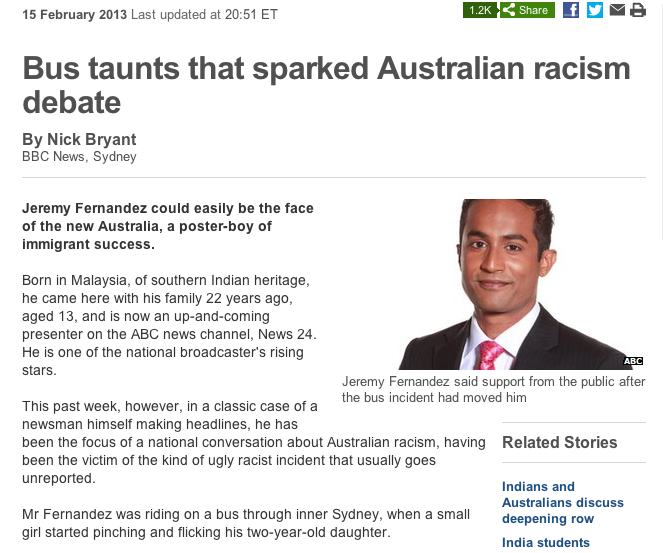This week in #loweclass we focused on writing profiles by following the "show don't tell" model of writing to capture a subject's character. I especially enjoy writing and reading profiles because it allots time for me to get to know a person and find out what makes him or her unique. In my opinion the BBC delivers well-written, newsworthy profiles, but drives its viewers away from reading them because they are not easily accessible. It took a number of searches and mouse clicks to lead me to a page that listed profiles.
The article I eventually came across, titled "Bus taunts that sparked Australian racism debate," did an excellent job of profiling Australian News Reporter Jeremy Fernandez. The profile began with an anecdotal lead that introduced me to both Fernandez and the subject at hand. The presence of an anecdotal lead reinforced what Professor Lowe had taught us in class on Monday, which is that an anedcdotal lead exposes the reader to the present, past and future of the character. It was good for me to see this in writing, and done well by author Nick Byrant.
The article I eventually came across, titled "Bus taunts that sparked Australian racism debate," did an excellent job of profiling Australian News Reporter Jeremy Fernandez. The profile began with an anecdotal lead that introduced me to both Fernandez and the subject at hand. The presence of an anecdotal lead reinforced what Professor Lowe had taught us in class on Monday, which is that an anedcdotal lead exposes the reader to the present, past and future of the character. It was good for me to see this in writing, and done well by author Nick Byrant.
Speaking of Nick Bryant, this is the first time I have seen a byline on any article posted by the BBC. On a previous blog post I expressed my disappointment of the BBC's decision to not give a byline. It was nice to see a BBC journalist finally get credit for his work. This was smart on the BBC's part because Nick Bryant is a feature and profile writer. After reading this article the reader will know to search Bryant's name to find more profiles instead of wasting his or her time trying to navigate profiles from the home page.
Another component of this profile that jumped out at me was Bryant's ability to make the profile newsworthy. Earlier this week when I was writing a profile on a guest speaker that came to class, I had a hard time intertwining his characteristics and the news of his arrival to campus. This article provided a great example of how a profile can reveal news just as effectively – if not more effectively – than a hard-news story. It tied Fernandez's story to a bigger picture issue that we aren't familiarized with regularly but should be so that issues like Australian racism are brought to light.
For anyone struggling to write a profile, I would suggest reading Bryant's story to get a better understanding of "show don't tell" writing. While he was introducing Fernandez and telling his story, as the reader I felt like I was sitting on the bus with Fernandez watching his "Rosa Parks moment" take place. In my opinion, showing a reader what happened is much more powerful than telling a reader what happened, which is why I prefer to read profile stories. I think, depending on the story, it can cause the reader to form a connection to the character, and in the end may be more effective in persuading the readers to take action.
Having enjoyed this profile so much, I hope to see more profiles show up on the home page of the BBC's website. Since the BBC covers such a large amount of global news I know it will continue to be hard for me to find profiles, but for me it would be worth it to keep digging.
Another component of this profile that jumped out at me was Bryant's ability to make the profile newsworthy. Earlier this week when I was writing a profile on a guest speaker that came to class, I had a hard time intertwining his characteristics and the news of his arrival to campus. This article provided a great example of how a profile can reveal news just as effectively – if not more effectively – than a hard-news story. It tied Fernandez's story to a bigger picture issue that we aren't familiarized with regularly but should be so that issues like Australian racism are brought to light.
For anyone struggling to write a profile, I would suggest reading Bryant's story to get a better understanding of "show don't tell" writing. While he was introducing Fernandez and telling his story, as the reader I felt like I was sitting on the bus with Fernandez watching his "Rosa Parks moment" take place. In my opinion, showing a reader what happened is much more powerful than telling a reader what happened, which is why I prefer to read profile stories. I think, depending on the story, it can cause the reader to form a connection to the character, and in the end may be more effective in persuading the readers to take action.
Having enjoyed this profile so much, I hope to see more profiles show up on the home page of the BBC's website. Since the BBC covers such a large amount of global news I know it will continue to be hard for me to find profiles, but for me it would be worth it to keep digging.

 RSS Feed
RSS Feed